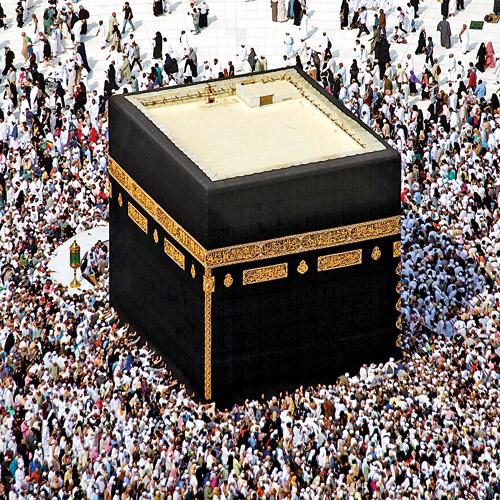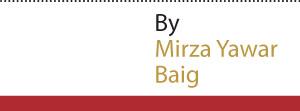- Human values apply to everyone, not only to Muslims, but Muslims have an additional responsibility to act by them because they are Muslim
- Muhammad (SAS) said, ‘The best of you is the one who is best to his neighbour.’ He did not say, ‘Muslim neighbour’. He said, ‘Neighbour’
Reading biographies is the best way to learn life lessons because it is a record of practice. The life of Muhammad
|

Makkah is home to the Ka’aba, the House of Allah built by Ibrahim (Abraham) and a place of pilgrimage from time immemorial
|
(SAS) is one of the best documented in history. But why is it important today? Because in a period of 23 years, he took his people from being the most oppressed in their community to being its leaders and role models; and he did that without lies, corruption, violence, or bloodshed. Would you like to know how to create a transformational change in your society? Then study his life.
If you look at the Makkan society of the 7th century with its similarities to our 21st century you will understand my hypotheses that because Muhammad (SAS) despite having almost no resources, support or political power, could still bring about a positive transformation of his society, we can hope that his methods can work for us also
7th Century Makkah- where Muhammad (SAS) lived until the age of fifty- was a microcosm of our global capitalist, pluralist, multicultural, multiracial society. Makkah is home to the Ka’aba, the House of Allah built by Ibrahim (Abraham) and a place of pilgrimage from time immemorial. The environs of the Ka’aba were a sanctuary and all killing and fighting were banned. Makkah was a safe haven for any of the many frequently warring tribes to come and do business in. In Makkah, businessmen ran the town. The Makkan society was based on a free market economy. No central authority regulated markets. Traders charged the best price they could get, hoarded in times of scarcity, and sold at great profit and brought goods from as far afield as Syria and Yemen to sell in Makkah. As an aggregator of people from all Arabia Makkah was a great seller’s market with high prices for goods not available anywhere else in Arabia. That is how Makkan traders created an oligarchy. Makkah was also multicultural and pluralistic as all centres of trade tend to be because to promote trade you must make it easy and safe for people from multiple races, beliefs, and cultures to coexist peacefully. That is good for business. You can see how similar this is to our global society today.
"Makkah was also multicultural and pluralistic as all centres of trade tend to be because to promote trade you must make it easy and safe for people from multiple races, beliefs, and cultures to coexist peacefully. That is good for business. You can see how similar this is to our global society today"
Makkan society 
If you look at the Makkan society of the 7th century with its similarities to our 21st century you will understand my hypotheses that because Muhammad (SAS) despite having almost no resources, support or political power, could still bring about a positive transformation of his society, we can hope that his methods can work for us also. Alphonse de Lamartine, in his book, ‘History of Turkey’ says, “If greatness of purpose, smallness of means and astonishing results are the three criteria of a human genius, who could dare compare any great man in history with Muhammad?”
The changes that Muhammad (SAS) brought about were ideological, ethical, moral and they changed not only the lives, but also the structure, laws, morals and behaviour of the Arab society. These changes in people’s values led to changes in priorities, which changed behaviour and society. As they say, it all begins at the top and in the mind. All change must begin with us internally; our world view, our aspirations, our definition of success, and right and wrong must all change, if we want to change our circumstances.
In our race to grab all resources with no thought about others, we have created a society that is crying out in pain and grief. The good news is that what we created, we can change. If not we will permanently poison the earth and make ourselves extinct. Muhammad (SAS) focused on three principles:
1. Accountability to our Creator to whom is our return
2. Truthfulness
3. Spreading goodness
This is the essence of Islam. That was why he said, ‘The best of you is the one who is the most beneficial to all people.’
1. Accountability to our Creator from whom nothing is hidden
What makes a mistake, a crime, is that the criminal knows that what he is doing is wrong, but he does it anyway, because he can get away with it. Muhammad (SAS) taught that everything we think, speak or do is known by our Creator to whom we must give an account of what we did. He taught that human values apply to everyone, not only to Muslims, but Muslims have an additional responsibility to act by them because they are Muslim.
2. Truthfulness
Muhammad (SAS) was known among his people from the beginning as– The Truthful and Trustworthy. And he taught us to be truthful in every aspect of life. Someone asked, ‘What is it that a Muslim cannot possibly do?’ He replied, ‘A Muslim cannot tell a lie.’ He taught that virtue and vice are absolute values, not relative to personal worth, religion, race, or anything else. He said to his daughter, Fatima, ‘O! Fatima do not think that you will be favoured by Allah because you are the daughter of His Messenger. You will stand before your Creator based on your own deeds.’ Truthfulness is the basis of all goodness. He was truthful to the extent that when he was forced to migrate to Madina, he still had valuables his enemies had entrusted him with. He gave them to his cousin and instructed him to return them to their owners. The highest affirmation is to be trusted even by your enemies.
3. Spreading goodness all around
Muhammad (SAS) said, ‘The best of you is the one who is best to his neighbour.’ He did not say, ‘Muslim neighbour’. He said, ‘Neighbour.’ In Islam, there is no distinction between Muslims and non-Muslims in respect of the rights of citizenship. All people are equal in the sight of Allah.
In conclusion, Muhammad (SAS) left a code of conduct and behaviour that is as applicable today as it was in his time. If we follow his way, then we can solve our global problems and create a society based on compassion, mutual responsibility, and accountability.
How’s that for a new world order?
